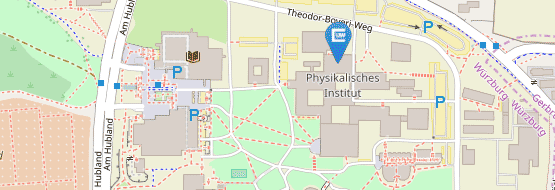i-RTG
Integrated Research Training Group
Summary
In the past two funding periods of the SFB 1170, we have achieved numerous scientific breakthroughs and established the Julius-Maximilians-Universität Würzburg (JMU) as a place-to-be not only for es- tablished but also for early-career researchers working in topological and correlated solid-state ma- terial physics. The successful career pathway of our graduates provide overwhelming evidence that the excellent scientific setting within the SFB 1170 features the perfect hatchery for a prosperous professional development at all stages of an academic career. Especially, early-career scientists can significantly benefit by an environment which supports interaction with principal investigators (PIs) and supporting staff within and beyond the respective scientific projects. As we will point out be- low, the integrated Research Training Group (i-RTG) within the SFB 1170 has established a broad framework of measures, ranging from lectures, colloquia, retreats, and schools, supplementing the on-the-job training by a wider scientific education. One corner stone of the broad educational program are topical lectures and seminars organized by the i-RTG board with input from PIs, postdoctoral researchers, and PhD students. Furthermore, speakers in our ToCoTronics Colloquium are invited to also present dedicated lectures on their re- spective field of expertise. To avoid inhibitions which may exist if an early-career scientist’s supervisor is present in the audience, these lectures are exclusively accessible to students, PhD students, and postdocs. Another element of our in-house training is the highly successful series of Retreats and ToCoTron- ics International Fall Schools, which—with support from PI’s and the SFB’s administrative staff–are responsibly organized and executed by our most active PhD students. In spite of the Covid-19 pan- demic, the two events organized in 2019 and 2021 attracted about 200 participants each, among them about 100 early-career scientists within the SFB 1170. Furthermore, with the help of i-RTG funds, the early-career scientists within the SFB 1170 have the opportunity of visiting international summer or fall schools to also obtain training through ex loco activities. We are aware, however, that the employability of our graduates, may it be in academia or in the private enterprise sector, will not only depend on their scientific skills in experimental or theoretical solid-state physics, but also on transferrable, non-scientific skills which become more and more im- portant in a highly cross-linked and interdisciplinary work environment. Therefore, we complement the scientific education provided within the SFB 1170 by a wide training and educational course pro- gram which provides the graduates with a broader background of qualifications useful for their future professional career. As a new element in our i-RTG training, to equip our graduates with the skills required to found their own business, we will offer courses in business start-up and agile innovation, a holistic innovation methodology which has transformed the software industry over the past decades and is currently adopted by companies from other sectors. By continuing the successful components of i-RTG’s education program and further strengthening it by new components we expect to continue the excellent service of the SFB 1170 in preparing our early-career scientists for their professional future.


